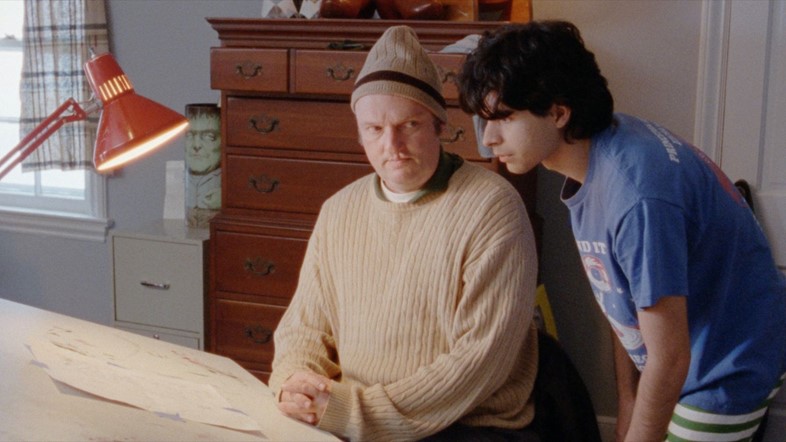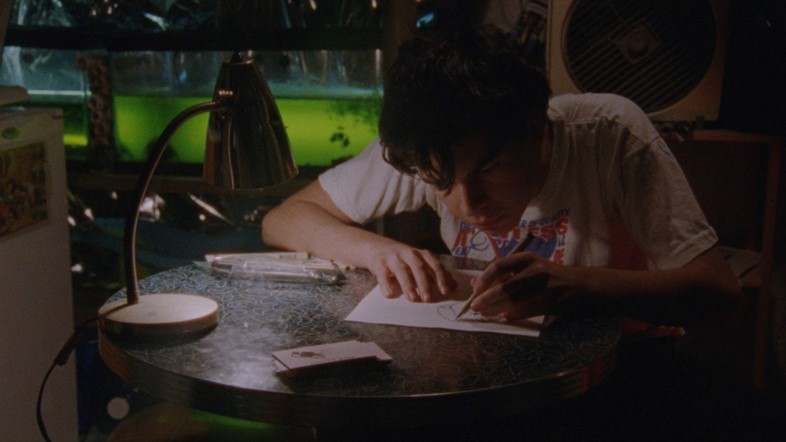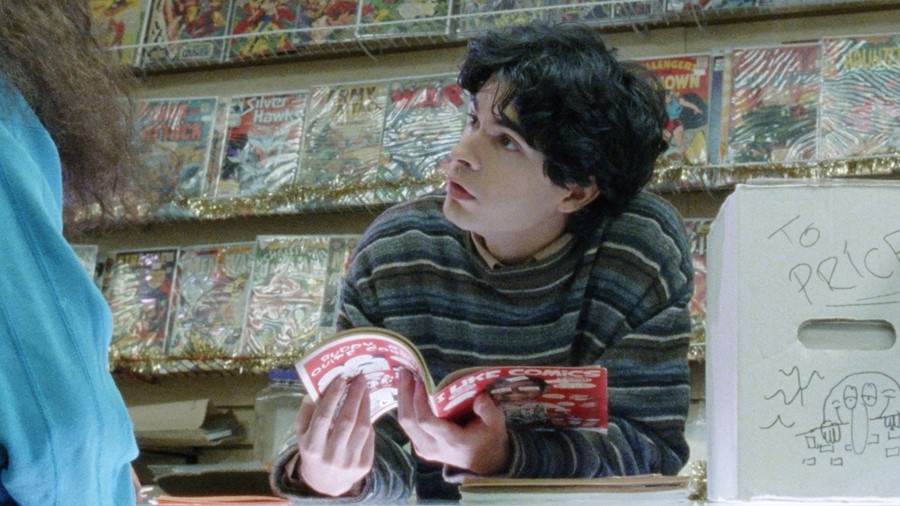As his debut film is released, Owen Kline talks about acting in The Squid and the Whale as a child, working with Josh and Benny Safdie, and why comedies have just as much depth as dramas
In Noah Bambauch’s The Squid and the Whale (2005), the messy divorce of parents Joan and Bernard (played by Laura Linney and Jeff Daniels) has a catastrophic effect on the family – a pack of intellectual types who live in a brownstone in the lush neighbourhood of Park Slope in Brooklyn, New York. The youngest child, 12-year-old Frank (played by an adorable, comically gifted Owen Kline), develops bizarre habits; he begins drinking beer, becomes fascinated by his mother’s sexual escapades, and most unforgettably, starts to masturbate around school, smearing his semen across the spines of books in the library and on locker doors. With The Squid and the Whale, Baumbach – who has made an illustrious career with films detailing quirky familial relationships – created an amusing, painful portrait of divorce, and the awkward, sometimes skewed effect it can have on children.
“My dream since doing The Squid and the Whale was to make a small, independent movie that was a comedy, but that would be lyrical as well,” says Kline, who has now transitioned from child actor into fully fledged writer-director with his first feature film, Funny Pages. Released by A24 this September, his debut is exactly that; a comical, lyrical portrait of a nerdy young comic book artist trying to make his way in the world.

The film’s lead is Robert (played by Daniel Zolghadri, Eighth Grade), a comic-obsessed 17-year-old who pisses off his parents by refusing to go to college after the unexpected death of a mentor. Leaving his cushty, middle-class life in suburban New Jersey behind, he moves to the “shithole” city of Trenton into a truly nightmarish, boiling hot basement apartment with two middle-aged, deeply strange men. Robert, however, is completely unfazed; he navigates dodgy characters and situations – of which there are many in the film – with a staunchly optimistic, childlike sense of naivety.
“The story of the movie was always this kid trapped in this hellscape which he doesn’t really know how to get out of,” says Kline over Zoom from his book-filled office in Queens, New York. “He’s in too deep … with all these kinds of strange figures.” Robert later works part-time at a comic book store and at the office of a public defender, where he meets Wallace (Matthew Maher) – a former comic book colour separator, now a mentally unhinged criminal – who he becomes obsessed with. Things, as expected, don’t end up going particularly well between the pair of them, and Robert gets a rude awakening about how people aren’t always who you think they are.

Kline insists that Funny Pages is not strictly autobiographical, although he’s quick to point out the parallels between his own life and that of the main character. “I grew up pretty focused, wanting to be a cartoonist at a very early age,“ he says. “I also wanted to drop out of high school and definitely found myself orbiting strange institutions, environments, people in my life.”
Kline’s obsession with strange characters and scenarios is something he shares with the Safdie brothers – the director duo behind the frenetic films Good Time and Uncut Gems – who produced Funny Pages. After spending years developing the script – “I was just a very angry person at that time and sort of struggling in my professional and personal life” – Kline finally got Josh Safdie to read it, who he had befriended after watching one of his early short films, We’re Going to the Zoo (2006). “I just hadn’t seen anything like that, that was new and personal and odd and freewheeling and interesting,” he says. The pair later struck up a friendship, with Kline crewing on some of their early films in New York and even acting in one (John’s Gone, 2010). “Josh was very supportive of me as an artist at a really young age,” says Kline. “After he finally read the script, he told me you know, we want to make this and help you with this, and do it the right way.”
The Safdie’s hands are evident throughout Funny Pages, although Kline’s movie is inherently different in spirit to theirs. Cinematographer Sean Price Williams’ colourful, intimate close-ups return (he captures the light on shrink-wrapped comic books like drapery in a Caravaggio painting), as does the inclination for street-cast, eccentric actors who favour realism above all else (Kline worked with Safdie-approved casting director Jennifer Venditti, while Buddy Duress makes an amusing cameo, repeating a line from Good Time word for word). Though Kline and the Safdies both adopt a freewheeling, character-driven approach to cinema, it’s much easier to root for Robert in Funny Pages – and less so for Good Time’s dirtbag protagonist, Robert Pattinson’s dishevelled Connie. The directors are, however, united in their love of developing characters’ “idiolect” – the speech habits peculiar to a particular person – and their approach to screenwriting. “Something I share with the Safdies is that we’re both very, very suspicious and sceptical of the screenplay format,” says Kline, who redrafted his script hundreds of times – just like the Safdies did with Uncut Gems.
Despite all the havoc in Funny Pages (Robert is particularly bemused by adult sexuality – “I just thought sexual repression was more interesting for the character,” Kline explains), Robert retains a sense of humour and a burning faith in the people around him, however sketchy they seem. “There’s as much depth to humour as there is to drama,” Kline believes. “People are very serious. I’m serious about some things, but most things I see through the lens of humour in my life … I’ve found that to be a healthier approach.”
Funny Pages is out in UK cinemas now.
